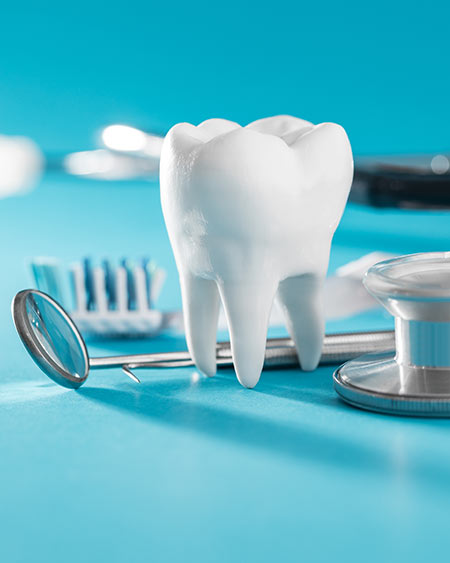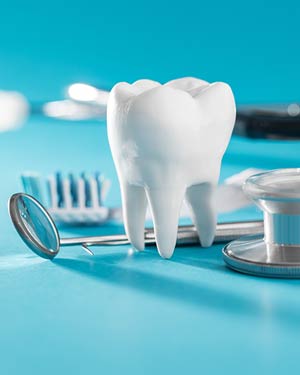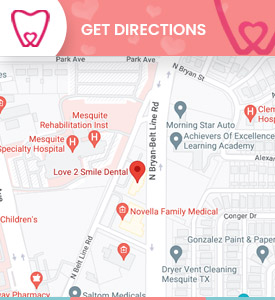Emergency Dentist Serving Mesquite, Dallas TX
A dental emergency refers to a variety of dental problems that require immediate treatment from a dentist. Dr. Divya Nagaraj DDS and her experienced team provide comprehensive and specialized dental care. Learn more about dental emergencies by contacting us at Love 2 Smile Dental Practice. Connect with us with any questions you may have or, when ready, you can schedule an appointment online at your earliest convenience. We are located at 1050 N Bryan-Belt Line Rd Ste 102, Mesquite, TX 75149.




Table of Contents:
What is considered a dental emergency?
How much does an emergency dentist cost?
How do I get an emergency dentist appointment?
We are all familiar with routine dental visits that involve teeth cleanings, dental evaluations, and developing a treatment plan to address any dental concerns. While these visits are essential to good oral hygiene, sometimes dental emergencies occur, oftentimes outside of a normal dentist’s hours of operation. Fortunately, certain dental clinics can handle these dental emergencies, providing urgent care necessary for the health of each and every tooth.
Several situations might be considered a dental emergency, including:
• Unexplainable Toothache — Toothaches are the body’s way of saying that something is not right in the teeth or mouth. A qualified emergency dentist can help diagnose and treat toothaches, and they can address the underlying cause for long-term relief.
• Swollen or Bleeding Gums — Occasional gum irritation is normal and is not considered a dental emergency, but gums that will not stop bleeding, especially when occurring alongside pain and swelling, can indicate a serious underlying dental or health issue. Seeing a dentist right away can help resolve these symptoms and restore good oral health.
• Swollen Jaw or Mouth — If the mouth or jaw suddenly becomes swollen for no apparent reason, it is time to make an emergency appointment at the dentist. Unexplained swelling in the mouth or jaw can indicate an infection, irritation to the lymph nodes, or some other factor that should be immediately treated.
• Exposed Nerves — Exposed nerves are an excruciating dental concern that will only get worse the longer treatment is delayed. It is imperative to seek emergency dental care as soon as possible in order to prevent infections, further nerve damage, or more extensive dental treatments down the road.
• Knocked-Out Tooth — If a tooth becomes dislodged or knocked out completely, it is imperative to take immediate action. If quick action is taken after a tooth has been knocked out, it is possible for an emergency dentist to reinsert and preserve the tooth without any long-term complications.
• Missing Filling — Because teeth can easily break or chip without that added reinforcement, missing a filling is another potential dental emergency. A missing filling can even expose the tooth’s nerves, a dangerous situation that can lead to a number of other dental issues.
• Broken Crown — Teeth are exposed and vulnerable to infection and damage when a dental crown breaks or falls off completely. Patients may be able to avoid needing a root canal, extraction, or other dental procedure if they schedule an emergency dental visit to replace the crown right away.
• Abscessed Tooth — A severe and potentially life-threatening condition, dental abscesses occur when a pocket of pus in the tooth causes an infection. As the infection can spread into the jaw, surrounding tissue, and other areas of the body, an abscessed tooth is an emergency.
• Food/Object Lodged Between Teeth — While pieces of food become stuck between the teeth every day if no amount of brushing or flossing will help to remove a stuck piece of food, an emergency dentist should be seen right away.
The cost of an emergency dental procedure varies from one patient to the next and greatly depends on a variety of factors, including the severity of the issue, how many teeth are affected, the location of the dentist, and the patient’s level of dental insurance. On average, the cost of an emergency dental visit can range between $100 to over $1000, with insurance coverage greatly reducing this number.
If you need an emergency dentist appointment, come to Love 2 Smile Dental Practice. Our emergency dentist can help you handle your dental concerns and improve your oral health.
Love 2 Smile Dental Practice is dedicated to providing you with all of your emergency dental needs. We look forward to serving you! Connect with us with any questions you may have or, when ready, you can schedule an appointment online at your earliest convenience. We are located at 1050 N Bryan-Belt Line Rd Ste 102, Mesquite, TX 75149. We serve patients from Mesquite Dallas TX, Sunnyvale TX, Forney TX, Balch Springs TX, Garland TX, Rowlett TX, and surrounding areas.


Additional Services You May Like
▸ Emergency Care
▸ Smile Makeover
▸ Invisalign
▸ General Dentistry
▸ Dentures
▸ Root Canal
▸ Dental Fillings
▸ Teeth Whitening
▸ Oral Cancer Screening
▸ Tooth Extraction
▸ Dental Crown
▸ Dental Bridges
▸ Dental Check-ups & Cleaning
▸ Pediatric Dentist
▸ Cosmetic Dentistry
▸ All-on-4 Dental Implants
▸ Dental Implants
▸ Single Tooth Implants



